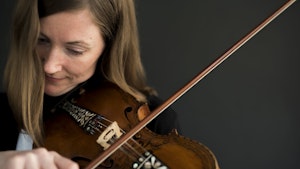She is defending her thesis "Performing Norwegian American. The Construction of Identity Through Performances of Village Dance and Norwegian-American Old-Time Music in the Upper Midwest, 1900–1970".
The first folk musician to defend her PhD at NMH

Laura Ellestad will defend her PhD in performance practice at the Norwegian Academy of Music on Wednesday, 31 May. She thus becomes the first folk musician to do her dissertation at the Academy.
How did musical practices contribute to the construction of Norwegian-American identities? Laura Ellestad's thesis examines the music culture in Norwegian-American communities in the upper Midwest from 1900–1970.
The work describes how performance forms of the two music genres, village dance music and Norwegian-American old-time music, contributed to creating diverse Norwegian-American identities during significant changes in the USA. This historical and ethnographic study is based on an interdisciplinary, comparative approach and analyzes a large amount of qualitative data collected through archival research and fieldwork in the Midwest.
Ellestad begins by investigating how Norwegian-American musicians engaged in interplay processes with global and local forces and how these processes reflect diverse identity construction processes. Drawing on Mark Slobin’s framework for the study of subcultural music (Slobin, 1993), Ellestad finds that Norwegian-American musicians engaged in three broad processes of interplay: intersubcultural interaction, the use of super cultural materials, and interplay via the diasporic intercultural. Further, she argues that these processes reflect two central dynamics of identity construction: plasticity, permeability, ethnic boundary negotiation, and positioning and mythmaking processes. Ellestad then examines a selection of performance contexts for the two genres through case studies of historical performers Dagny Andrea Veum Quisling and Daniel Aakhus.
By investigating a wealth of empirical evidence, the dissertation offers a novel understanding of how Norwegian-American musicians performed, negotiated, and extended identities and boundaries, expressing narratives of the past, individual and collective dreams, loyalty to the homeland, and compatibility with American ideals.



